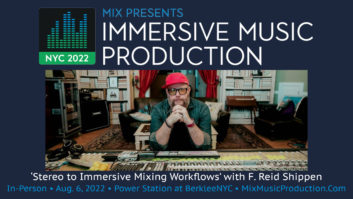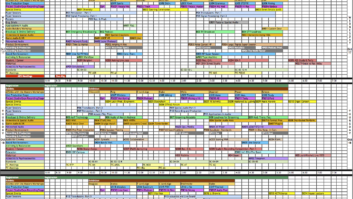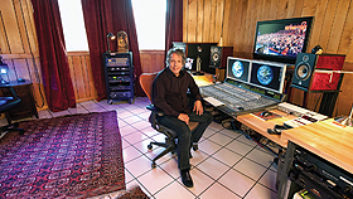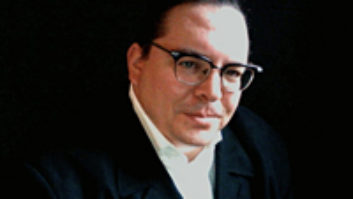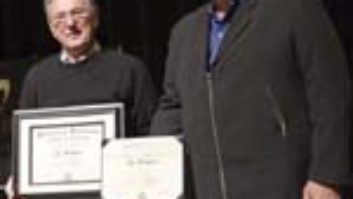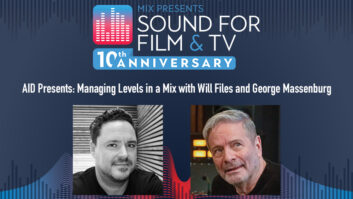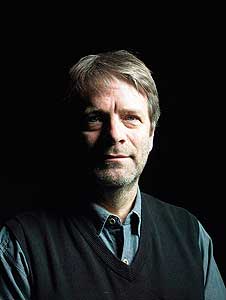
So I just found out that your life changed pretty dramatically. How did this move from Nashville to Montreal come about?
Well, I’ve spent a fair amount of time in classrooms, and I’ve been an adjunct professor here at McGill for about 15 or 16 years. Finally, I succumbed to an invitation from Wieslaw Woszczyk to teach. We have a superb Sound Recording program up here, Master’s only, and a great infrastructure—the largest purpose-built scoring stage to come online in North America in the past 40 years. You have to have a music degree (perhaps for an instrument) coming in. It’s essentially modeled on the European Tonmeister track with an added emphasis on practice. Our faculty includes Richard King, formerly of Sony Classical, and Martha DeFrancisco, formerly of Philips. These are serious producer/engineers who understand the importance of quality sound and meticulous methodology. I packed up my gear, found a nice apartment 10 minutes walking distance from the facility and now I’m immersed.
Did they go after you for the research or the studio life?
A little of both. McGill has solid research credentials in many departments, including sound. Our Master’s students fall into one of three main areas. About a third go on to careers in education, teaching and starting new Sound Recording departments at other universities. About a third move onto a Ph.D. And another third will become practitioners, doing audio engineering for sound and music recording, Internet, TV and motion pictures, and also doing R&D in industry. Also, I’ve agreed to supervise a Ph.D. candidate, one who is doing advanced research testing in sound perception, and focusing on codec issues and other artifacts that we’ve been suffering with as listeners. That’s something I’ve been casually trying to figure out for years—on the professional and consumer sides. I’m also working with this terrific young artist named Marilou and her fantastic band, so I get to keep my ears in the studio, too.
Even though you’ve been teaching for decades, you’ve also been an outspoken critic of audio education. And now you’re on the inside.
This is the best time imaginable to be alive and working in or around music. There are fantastic opportunities, a huge new constituency—the world’s out there, man!—and great game-changing technology. But it’s really not the technologies themselves where we’re getting it egregiously wrong. I think we’re missing the practitioners. And that reveals a gap in education, in my view.
How so?
My problem is with anybody who tries to teach without knowing what the real gig is, anybody who tries to advance the fiction that you can teach without a real room (aka, a studio), without musicians, with no experience in critical listening. Students, interns, assistants—and you know me, I’m blunt—they need to sometimes just shut up, sit in the back of the control room and learn how to listen. Listen to the music, the nuance, the lace and filigree, as Doug Sax calls it. And more—maybe the bass player is talking about some cool track they heard last night. That’s a clue you need to pick up on. It’s that socialization that takes place in the studio that’s missing.
But then again, this idea of “training” a “recording engineer,” well, who needs training in the face of cheap access to self-prompting, sometimes highly automated, tools? Go out and get a cheap, no-support deal from Guitar Center, bring home a buncha boxes, plug ’em in, turn ’em on and check Gearslutz or the DUC if you have any glitches. Bring up the music creation software, the DAW, the plugs, the loops, the samples, more plugs. Tweezer some song ideas together from a torrent of the more-than-accessible pool of “current pop hits.” Sample some stuff. Get the babysitter to sing it, tune it, shift it and hit Record. Shit! Wait, don’t forget to squash the f*** out of the mix with some crappy plug with presets and how can you go wrong that that? Fan-TASTIC! Sounds like a hit Lady Gaga record, right? No problem.
So why doesn’t it sound, uh, good? What’s missing? Well, lots of stuff. A sense of a story that’s worth telling, maybe a melody, maybe not. But more than anything else, a killer performance. Maybe a singer who can sing in tune or close enough to it; a performance with some sense of innovation and presence, with the subtleties, the idiosyncrasies, the unknowns—the unknowables. What the hell was John Lennon thinking? [Laughs]
But seriously, we believe that there are plenty of jobs out there. And it’s clear that there’s specific training that’s required in an increasing number of different “sound engineering”–related careers. But in an era where the cosmos has the last laugh, there are less and less seats at a traditional recording console in a traditional pop music recording studio for a “fader-pusher.” Besides Al Schmitt, few now depend on getting continued calls
Any final advice to students, now that the real George has had his say?
[Laughs] Couple of things would help. Get a real education. Learn accounting—how to read a profit-and-loss statement and a balance sheet. Get a real career—work in a hospital emergency room, like my friend Luca Pilla, between sessions. Learn graphic arts, shooting and editing video. Oh yeah, would you please learn how to write? And, at all costs, avoid thinking about getting rich. When the time is right, be ready to tell a real story, not just some regressive, simplistic, emo drivel about the bad hand that’s been dealt you at the hands of the powers of the universe.
Then learn to listen. It’s almost a lost art. And I mean critical listening to real musicians in a real space. But I also mean listen for subtlety, for nuance. Listen to how producers interact with musicians, how musicians interact with each other, how engineers can make a big difference capturing real performances. Maybe also learning how with a subtle placement of a microphone you won’t have to use a plug-in. Then, listen for the story in the song. That’s why we’re here.
